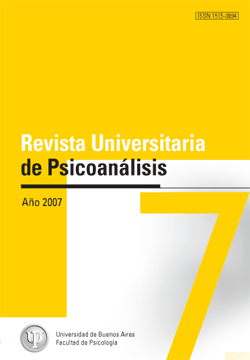Revista Universitaria de Psicoanálisis - Volumen VII

Sobre la traducción y la confusión de lenguas
About Translation and the Confusion of Languages
Autor/es: Miguel Gutiérrez Peláez
RESUMEN
Palabras clave:
Translations continue to be one of the main problems for the writing, teaching and investigation in Psychoanalysis. The following article presents certain ideas surrounding Derrida’s investigations on translation and his study of Benjamín’s work. Some elements concerning the myth of the Tower of Babel will be taken into account, as well as its effect over the confusion of languages. From Psychoanalysis, in particular from Freud and from Ferenczi’s (1932) article “Confusion of Tongues between the Adult and the Child”, the effects of translation over language as trauma will be analyzed. Finally, the effect of Nietzsche’s concept of “God is dead” over translation will be worked on, opposing it to the intent of avoiding the effects of the confusion of languages by the discovery or creation of a unique (fundamental) language.
SUMMARY
La traducción continúa siendo una de las problemáticas centrales de la escritura, enseñanza e investigación en psicoanálisis. En el presente artículo se desarrollan algunas ideas alrededor del trabajo de Derrida sobre la traducción y el estudio que hace de Benjamin. Se retomarán algunos elementos que atraviesan el mito de la torre de Babel y su efecto sobre la confusión de lenguas. Desde el psicoanálisis, en particular desde Freud y desde el artículo de Ferenczi (1932) “Confusión de lengua entre los adultos y el niño”, se pensarán los efectos de la traducción sobre el lenguaje como trauma. Por último, se pensará el efecto de la muerte de Dios en Nietzsche sobre la traducción, oponiéndola a los intentos de sortear la babelización a partir de la creación o descubrimiento de una lengua única (fundamental).
Keywords:
Babel - Confusión de lenguas - Küsstechnik - Hipnosis - Muerte de Dios - Lengua de los pájaros.
Secretaría e Instituto de Investigaciones
Lavalle 2353
Tel/fax:4952 – 5481/ 4952 – 5490
Horario de atención: 10 a 17 hs
E-mail:
instinve@psi.uba.ar











